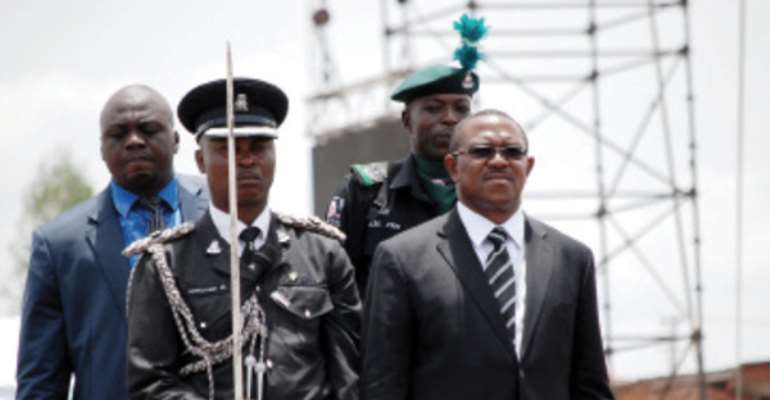COURT APPROVES SUBSTITUTED SERVICE ON ANAMBRA GOVERNOR

By Gowon Emakpe
March 23, 2010 02:45AM
Peter Obi (R) of Anambra State inspecting guards of honour by Nigerian police, after he was sworn in Awka, on Wednesday (17/03/10). Photo: NAN
A Federal High Court in Abuja yesterday, granted an order of substituted service to Valentine Onwugbufor on Governor Peter Obi of Anambra State.
Daniel Abutu, the Chief Judge of the Federal High Court, granted a motion ex parte move by Kayode Ajulo, the plaintiff counsel, seeking for an order for leave to serve the originating summons, motion on notice, and all other process or any order, on Mr. Obi by substituted service, through the means of publication of same in the Punch, or Thisday newspapers.
Mr. Ajulo said all attempts by the court bailiff to serve Obi proved abortive, stressing that security agents will not allow the court personnel to see him. He stated that if an order of substituted service is not granted, the court bailiff will not be able to serve the governor and the matter will be delayed. Mr. Abutu granted the motion as requested and adjourned till 13 April for mention.
The suit has Mr. Obi, the Independent National Electoral Commission (INEC), Maurice Iwu, the Chief Judge of Anambra State, and the contestants at the governorship election as defendants.
Matters for determination
Specifically, the plaintiff want the court to determine whether by constitutional parametres and the declaratory and subsisting effect of the judgment of the Federal High Court, Lagos, delivered on 4 February, Mr. Iwu, Victor Chukwuani, and Philip Umeadi are competent to continue to carry the functions and responsibility of INEC.
Also, whether INEC is competent to organise and conduct the election, and whether it is competent to declare and issue certificate of return to any candidate purportedly elected in an election, purportedly conducted by INEC.
The judge, Mohammed Liman, held that the elections body, as presently constituted, lacked the quorum required by the Constitution to conduct elections.
According to the judge, provisions of Section 159 of the 1999 Constitution require the quorum of INEC commissioners to be 'five members and not four, as constituted at present.'
At present, the election body has four Federal Electoral Commissioners, out of the 13 that are supposed to be on the board.
There have been no appointments into the vacant positions on the board and only the President, who has been absent from the country for over two months, is empowered by law to nominate members.
